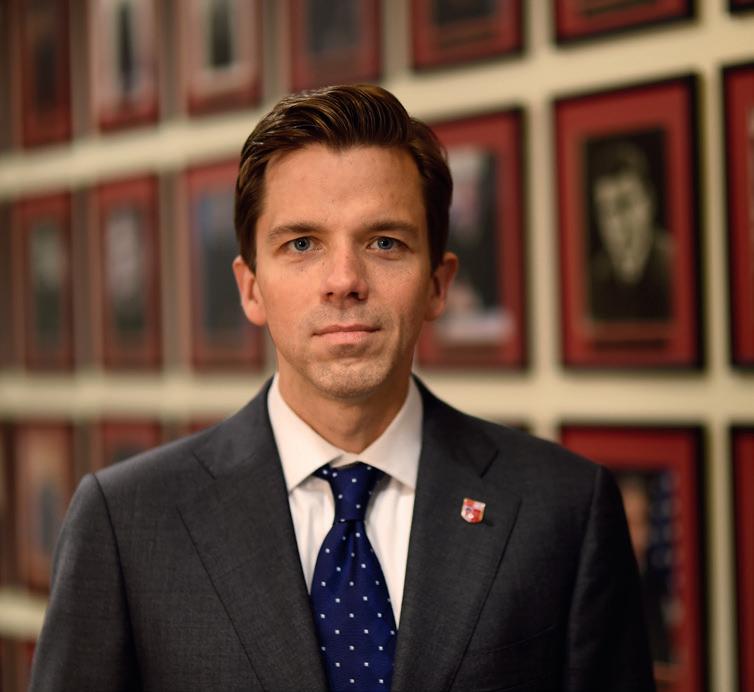
4 minute read
On Direct: Mattone Institute Director Robert J. Sein ’03
Mattone Institute Director Robert J. Sein ’03
In 2017, Robert J. Sein left the commercial real estate practice at Shearman & Sterling LLP and returned to alma mater as director of the Mattone Family Institute for Real Estate Law. In that role, he coordinates programs and initiatives, fosters the Law School’s connections with alumni and others in the real estate industry, and helps students realize their goals in the field. Sein is also an adjunct professor at St. John’s Law and the faculty advisor to the N.Y. Real Property Law Journal. Here, he sits down with the Law School’s director of communications, Lori Herz, to discuss his career path to, and work on behalf of, the Mattone Institute.
Advertisement
LH: What sparked your interest in real estate law?
RS: I came to St. John’s as an aspiring litigator. But my favorite 1L course turned out to be Property with Professor DiLorenzo, which sparked my interest in real estate transactions. From there, I took Co-ops, Condos, and Homeowner Associations with the inimitable Professor Rohan, among other courses relevant to the field, including Business Organizations, Tax, Trusts & Estates, Corporate Finance, Remedies, and Conflict of Laws. I was introduced to real estate practice as a summer associate at Shearman & Sterling. After graduation, there were openings in the firm’s Real Estate group, so I started there full time. Given my path to practice, I always encourage students to keep an open mind about areas of interest and new opportunities.
LH: What did you enjoy most about practicing commercial real estate?
RS: Like many real estate attorneys, I loved working on matters that had a tangible effect on the places people live, work, and play. For example, I worked on the ground lease for the Goldman Sachs World Headquarters in Battery Park City, which was the first major development in Lower Manhattan after 9/11. It was fulfilling to attend the tower’s groundbreaking, watch it go up, and see its positive impact on New York City. I also loved the diversity of deals I worked on throughout the United States. Real estate deals tend to be staffed leanly, so I was able to get great, realworld lawyering experience early on in my career. Plus I built a professional network that I continue to rely on every day.
LH: Why did you decide to return to St. John’s Law to lead the Mattone Institute?
RS: I come from a family of teachers—my mom was a New York City public school teacher, and my dad was a college physics professor—so, in a way, I was always drawn to the world of academia. And I’ve always derived joy and personal fulfillment from teaching and mentoring others. In fact, one of my favorite parts of legal practice was teaching CLEs and mentoring junior attorneys. Naturally, when I saw that St. John’s was hiring the Mattone Institute’s director, I was intrigued and applied almost immediately. It was a unique opportunity to combine my knowledge of real estate with my desire to work with students, while giving back to an institution that’s given me so much.
LH: What do you find most gratifying about your Institute leadership role?
RS: I love seeing our efforts result in positive job outcomes for our students. Sometimes, those results are direct, like when we introduce a student to a graduate who hires him or her. But, often, they’re indirect, such as where a student’s knowledge of real estate finance acquired through our programs opens the door to an interview and an offer. I also love interacting with our fantastic alumni and seeing them get more involved with the Law School and our students by guest lecturing, teaching a CLE, participating in a conference or roundtable, or mentoring. And I enjoy helping alumni enhance their real estate law credentials, grow their knowledge of the marketplace, and connect with job opportunities.
LH: How do St. John’s Law students benefit from the Institute’s programs and initiatives?
RS: There’s no better place to learn and practice real estate law than New York City. Our students get a real estate education that’s second to none through courses in Real Estate Development, Drafting: Real Estate Transactions, and Commercial Real Estate Leasing, among others. Their classroom learning is enriched by events—like fireside chats with leading practitioners and industry leaders—that help them expand their professional networks and gain insight into deals, current events, and industry trends. Many of our students also intern or extern at real estate firms, giving them the opportunity to apply their learning to real-world deals and disputes. Students can participate in the Real Property Law Society and on the N.Y. Real Property Law Journal. Our Real Estate Law Fellowship Program for selected upperlevel students has curricular, experiential, and participation components. And I work with our Career Development Office to help Real Estate Fellows and other students with their career development through resume review, mock interviews, and alumni meetings.
LH: What’s next for the Mattone Family Institute for Real Estate Law?
RS: Most immediately, we’re looking forward to a long-awaited return to in-person events. The virtual format has its advantages when it comes to events like CLEs, but it doesn’t work well for other things, like site visits or networking receptions. In the coming months, we’d like to increase our focus on affordable housing and evictions and foreclosures, which are some of the defining issues of our time. We’re also exploring the possibility of launching new real estate-focused degree programs, such as an LL.M. (Master of Laws) at St. John’s Law. It’s an exciting time!

